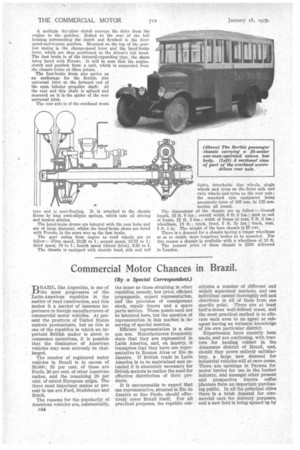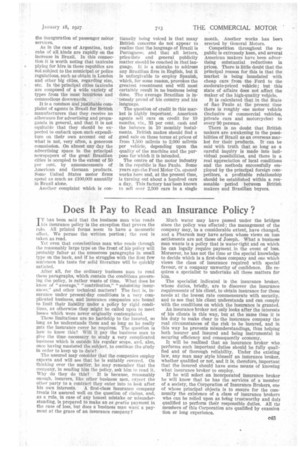Commercial Motor Chances in Brazil.
Page 66

Page 67

If you've noticed an error in this article please click here to report it so we can fix it.
BRAZIL, like Argentina, is one of the most progressive of the Latin-American republics in the matter of road construction, and this makes it a market of immense importance to foreign manufacturers of commercial motor vehicles. At present the products of United States makers predominate, but as this is one of the republics in which an important British maker is about to commence operations, it is possible that the dominance of American vehicles may soon seriously be challenged.
The number of registered motor vehicles in Brazil is in excess of 30,000; 50 per cent, of these are Fords, 30 per cent. of other American makes, and the remaining 20 per cent. of mixed European origin. The three most important makes at present in use are Ford, Studebaker and Buick.
The reasons for the popularity of American vehicles are, substantially,
(By a Special Correspondent.)
the same as those obtaining in other republics, namely, low price, efficient propaganda, expert representation, and the provision of consignment stock, repair depots and a spare parts service. These points need not be laboured here, but the question of representation in this market is deserving of special mention.
Efficient representation is a sine qua non. Manufacturers frequently state that they are represented in Latin America, and, on inquiry, it transpires that they have one representative in Buenos Aires or Rio de Janeiro. If British trade in Latin America is to be maintained and extended it is absolutely necessary for British makers to realize the need for effective distribution of their products.
It is unreasonable to expect that one representative, situated in Rio de Janeiro or Sao Paulo, should effectively cover Brazil itself. For all practical purposes, the republic con
stitutes a number of different and widely separated markets, and one individual cannot thoroughly sell and distribute in all of them from one specific point. There are at least half-a-dozen well-defined zones, and the most practical method is to allocate each area to an agent or subagent baying an intimate knowledge of his own particular district.
Experiments have recently been made, and are continuing, with tractors for hauling rubber in the Amazonas district of Brazil, and, should they prove entirely satisfactory, a large new demand for industrial vehicles will at once ensue. There are openings in Parana for motor lorries for use in the lumber Industry, and amongst other present and prospective buyers coffee planters form an important purchas• lug public. In all the principal cities there is a brisk demand for commercial cars for delivery purposes, and a new field is being opened up by
the inauguration of passenger motor services.
As in the case of Argentina, taxicabs of all kinds are rapidly on the increase in Brazil. In this connection it is worth noting that taxicabs plying for hire in these republics are not subject to the municipal or police regulations, such as obtain in London and other big cities, regarding size, etc. In the principal cities taxicabs are conipbsed of a wide variety of types from the most luxurious and commodious downwards.
It is a comin* on and justifiable complaint of agents in Brazil for British manufacturers that they receive no allowance for advertising and propagamin in general, and that it is not equitable that they should be expected to embark upon such expenditure on their own account out of what is not, very often, a generous commission. On almost any day the advertising space in the principal newspapers of the great Brazilian cities is occupied to the extent of 50 per cent. by announcements of American and German products. Some United States motor firms spend as much as £100,000 annually in Brazil alone.
Another 'complaint which is con
tinually being voiced is that many British concerns do not appear to realize that the language of Brazil is Portuguese, and that all letters, price-lists and general publicity matter should be couched in that language. It is a mistake to address any Brazilian firm in English, but it is unforgivable to employ Spanish, which, for some reason, provokes the greatest resentment and will most
• certainly result in no business being done. The average Brazilian is intensely proud of-his country and his language.
' The question of credit in this market is highly important. American agents sell cars on credit for 10 months, viz., 33 per cent. cash and the balance in 10 " monthly instalments. British makes should find a good sale on these terms at prices of from 1,500 milreis to 2,000 milreis per vehicle, depending upon the quality of the machine and the purpose for which it is intended.
The centre of the motor industry in the republic is Sao Paulo. Some years ago the Ford Motor Co. opened works here and, at the present time, is turning out about a hundred cars a day. This factory hasToeen known to sell over 2,500 cars in a single month. Another works has been erected by General Motors.
Competition throughout the republic is extremely keen, and several American makers have been advertising substantial reductions in prices. There is little doubt that the principal reason for this is that the market is being inundated with cheap cars from the Ford to the moderate-priced vehicle; but this state of affairs does not affect the maker of the high-quality vehicle.
It is calculated that in the State of Sao Paulo at the present time there is roughly one motor vehicle (inclusive of commercial vehicles, private cars and motorcycles) to every 90 persons.
There is no doubt that British makers are awakening to the possibilities of Brazil as an overseas market for their products. It can be said with truth that so long as a careful inquiry is made into individual possibilities, and there is a real appreciation of local conditions and the methods successfully employed by the principal foreign competitors, a profitable relationship should be established within a reasonable period between British makers and Brazilian buyers.












































































































